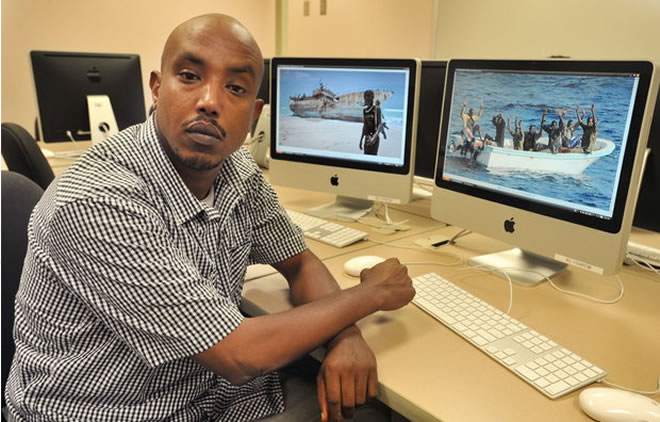MGSC student survives Somali war, has unique take on piracy


By JENNA MINK — [email protected]
Monday, October 21, 2013
COCHRAN -- When it comes to piracy, Middle Georgia State College student Ali Samatar has a unique perspective.
It’s a perspective he developed after enduring civil war in Somalia and four years in a Kenyan refugee camp. It’s a perspective he came to after immigrating to America, where he went from having nothing to working alongside top government officials.
It’s a perspective that is rarely explored, not even in the new movie “Captain Phillips,” which is based on a true story and chronicles the hijacking of a ship by Somali pirates.
Samatar, a senior logistics major who lives in Eastman, is a survivor who understands the horrors of piracy for sailors but also knows firsthand the consequences for his native country.
When interning with the federal government, Samatar won an award from the Maritime Association for his work, including a presentation he gave on Somali piracy.
‘There was a lot of misery’
“The poor Somalians,” Samatar, 38, said in between classes at his college’s Eastman and Cochran campuses. “The average person is caught between two tidal waves: criminals and terrorists.”
Read more here: http://www.macon.com/2013/10/21/2730802/middle-georgia-state-student-survives.html#storylink=cpy
Samatar prefers to concentrate on the citizens of Somalia, who are stuck in a country with a crippled government, which has lost control of its waters. As other countries began fishing and dumping toxic waste in Somali waters, the people tried to patrol those waters themselves, Samatar said. That makeshift coast guard transformed into the type of piracy that now is infamous, he said.
“It (started) as a Robin Hood type of thing,” he said, arguing that Somalians were simply trying to take from foreign sailors who used their waters illegally. “Then, the criminals came in. Then, the mafia came in.”
And the terrorism isn’t limited to the seas. In Somalia, drugs and other criminal activities have swept the country. Piracy has added to the instability of the nation, which continues to get a bad rap, Samatar said.
“Look at the name it has given us,” he said about piracy. “Somalia is known as the bad boy of East Africa ... but it’s really not. It’s tribal. It’s religious, and people are very diverse.”
The country has been struggling since civil war tore it apart in the early ’90s, ripping Samatar -- then a teenager -- from his family, killing his father and brother, and forcing him to spend about four years in a Kenyan refugee camp.
Samatar was 13 when the rebels invaded his hometown. He was away from his family’s home and was forced to join the mass exodus of refugees fleeing for their lives. It was years later when he learned what happened to his family -- his father and older brother were killed, and his mother and other siblings fled to Ethiopia.
“I had to live with the hope of being reunited,” he said.
In the refugee camp, Samatar slept in the open while waiting for huts to be constructed.
“Eventually, the rain came, and people started dying,” he said. “There was a lot of misery ... but I also saw hope. I saw humans at their best.”
People helped one another, and many survived because of organizations that sent in food and other necessities, he said. Samatar applauds the United States for helping Somalians.
Samatar, who took English classes in school, became a translator for international journalists in the camp, and he soon made friends with Kenyans, whom he lived with for a while to get out of the camp. When he found an opportunity to come to the United States, he grasped it.
‘He’s very inspirational’
Samatar worked as a security guard in New Jersey for a while before a friend convinced him to move to Atlanta. He fell in love with Georgia, became a permanent U.S. citizen and spent years working in pest control. He eventually brought his remaining family to the United States. Now, two of his siblings also are on their way to college graduation.
In 2010, Samatar made a decision: no one in his family had been to college, and he was going to be the first. With a love for flying, he enrolled in what was then Middle Georgia College to take advantage of its aviation program. Even though he decided that becoming a pilot was too costly, he still flies and works on planes at the Eastman campus.
“I think he’s very inspirational,” said Stanley Ketchel, professor in the Middle Georgia State School of Aviation and director of the supply chain management program. “He’s a leader ... and I think people can look at what he’s done in his life and all the challenges he’s had and interpret that as very inspirational.”
In December, Samatar will graduate with a logistics degree, and he plans to someday return to Somalia to offer aid and hope. But first, he likely will pursue a career with the federal government. After all, the Maritime Association was so impressed with his work as an intern that they gave him an award.
“It’s very difficult to get one of those internships,” Ketchel said. “Once he received the internship, he went out of his way to differentiate himself there.”
When Samatar’s boss asked him to write about his internship experiences, Samatar included his take on Somali piracy. Soon, Samatar found himself presenting his work -- and his life’s story -- in front of upper-level government officials. It was a personal challenge for Samatar, who not only wanted to conquer his fear of public speaking but was eager to voice his views on Somali piracy.
Many view Somalians in two ways: poor, starving citizens or pirates, he said.
But they are much more than that, Samatar argued. They are traditional and pious. They are survivors.
“They are people like me,” he said.
To contact writer Jenna Mink, call 256-9751
Read more here: http://www.macon.com/2013/10/21/2730802/middle-georgia-state-student-survives.html#storylink=cpy